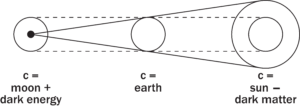An observer who is too dense (too condensed) has too much dark energy. An observer who is too diffuse (too expanded) has too much dark matter.

We can make the baseline 2D. Parkinson’s: We may draw behind the baseline, and become denser than light—up to a point. But draw back too far, and become “double dense,” “triple dense,” “quadruple dense,” and we alter the proton gradient. Suddenly we are ice, when reality is water. When we are ice instead of water, a new force emerges that we have to deal with every second of every day: the expanding force.
ALS: We may spring beyond the baseline, and become more diffuse than light—up to a point. But spring forward too far, and become “double diffuse,” “triple diffuse,” “quadruple diffuse,” and we alter the proton gradient. Suddenly we are steam, when reality is water. When we are steam instead of water, a new force emerges that we have to deal with every second of every day: the condensing force.
My pineal gland is always trying to read the density of the light in my environment. But my pineal gland—rightly or wrongly—assumes it is the correct baseline. It does not consider that it may be wearing “tinted glasses.”
If I am too diffuse, too large, too dilated—like having too much niacin—I will need too much iron (magnetism), to hold together. Now I can get stuck. If I lower my iron, my proton gradient will be too low. If I vasoconstrict, I will collapse.
If I am too dense, too small, not dilated enough—like having too little niacin—I will need too much manganese (“reverse-magnetism”). Now I can get stuck. If I lower my manganese, my proton gradient will be too high. If I vasodilate, I will explode.
I write more about time, proton gradients, and human health in a new essay, “Seeing at the Speed of Light.”